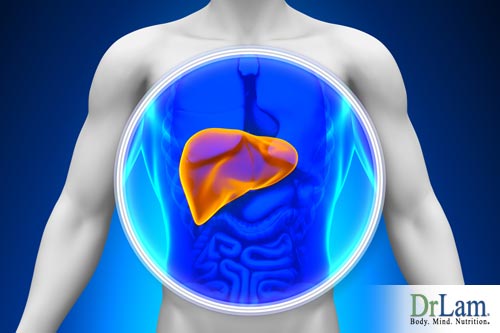 The liver, along with the kidneys, skin, and intestine, is the waste management plant of the body, and having proper liver health is important. The liver filters blood to remove bacteria, modulate bile secretion to eliminate cholesterol, regulate hemoglobin, breakdown products, and remove negative results left by prescription drugs.
The liver, along with the kidneys, skin, and intestine, is the waste management plant of the body, and having proper liver health is important. The liver filters blood to remove bacteria, modulate bile secretion to eliminate cholesterol, regulate hemoglobin, breakdown products, and remove negative results left by prescription drugs.
Because of its importance, the body has provided us with more liver than we normally need for daily living. A healthy person can donate half of their liver. Due to the excess reserves, liver injuries and damages are often not symptomatically recognized but are frequently given no attention to thinking it is a normal occurrence by many Adrenal Fatigue Syndrome (AFS) sufferers.
There is little room to disregard the role the liver plays for those in advanced stages (stages 3 and 4) of Adrenal Fatigue Syndrome. Without a strong and optimized liver, complete AFS recovery is retarded at best and often not possible. Fortunately, those in earlier stages of AFS (stages 1 and 2) normally do not present with significant liver congestion, unless there is a prior history of liver damage, such as with alcohol and infection. Fortunately, those in the earlier stages of our program may prevent liver damage from occuring.
Let us begin with understanding the role cortisol plays as the key determinant of liver and gallbladder health.
Cortisol is the body’s main anti-stress hormone secreted by the adrenal glands as a response to stress. Stress can be metabolic (such as a sugar imbalance), physical (such as over-exercise), or emotional (such as going through a divorce or accident).
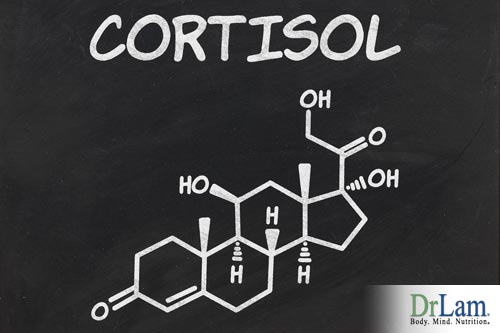 In addition to its many anti-inflammatory and metabolic control properties that are critical in stress reduction, cortisol has been found to have great effect on liver function. Elevated plasma cortisol has been shown to inhibit non-hepatic glucose utilization, raise plasma insulin levels, and increase hepatic gluconeogenesis in vivo. In addition, there is a direct connection between cortisol levels and fatty liver disease. This is seen in the early stages of Adrenal Fatigue Syndrome, where the adrenal gland production of this hormone is put in overdrive due to hypothalamic-pituitary-adrenal (HPA) axis overstimulation. High cortisol, a hallmark of early stages of AFS, is known to promote fat deposits in the liver and is associated with a higher incidence of non-alcoholic fatty liver. Fortunately, this is reversible. Studies have shown that in the absence of cortisol, liver fat accumulation slows. Our nutritional program may help balance cortisol levels.
In addition to its many anti-inflammatory and metabolic control properties that are critical in stress reduction, cortisol has been found to have great effect on liver function. Elevated plasma cortisol has been shown to inhibit non-hepatic glucose utilization, raise plasma insulin levels, and increase hepatic gluconeogenesis in vivo. In addition, there is a direct connection between cortisol levels and fatty liver disease. This is seen in the early stages of Adrenal Fatigue Syndrome, where the adrenal gland production of this hormone is put in overdrive due to hypothalamic-pituitary-adrenal (HPA) axis overstimulation. High cortisol, a hallmark of early stages of AFS, is known to promote fat deposits in the liver and is associated with a higher incidence of non-alcoholic fatty liver. Fortunately, this is reversible. Studies have shown that in the absence of cortisol, liver fat accumulation slows. Our nutritional program may help balance cortisol levels.
For decades, the medical community has known that those with liver cirrhosis present with a higher incidence of concurrent adrenal dysfunction. When the adrenal glands are not producing adequate amounts of steroid hormones, primarily cortisol, a medical condition called Adrenal Insufficiency (AI) or Addison’s Disease arises. Lifelong steroid therapy is required. This is very different from Adrenal Fatigue Syndrome, where the adrenal glands are still pathologically intact and making hormones, though at a lower level, but not low enough to be called AI. Symptoms of AFS are much more intense than AI in the early stages, but as AFS progresses to the advanced stage, sufferers can be incapacitated and bedridden.
The term hepatoadrenal syndrome is used to define adrenal insufficiency in patients with advanced liver disease who have sepsis and/or other complications. Liver cirrhosis is considered to be among the major groups of high-risk diseases with a predisposition to AI. Decreased levels of HDL and LDL cholesterol, along with increased levels of pro-inflammatory mediators, exhaustion or fatigue of the adrenal cortex, and glucocorticoid resistance have all been implicated as pathophysiologic mechanisms involved in AI development in critically ill patients with sepsis. Clearly, adrenal and liver health and functions are closely connected. The key connecting bridge is cortisol. The exact mechanism is not yet known, but it is clear that liver and adrenal dysfunction is closely tied. It is important, therefore, to look at liver health comprehensively anytime adrenal dysfunction is implicated. Supporting adrenal health is thus an essential part of supporting liver health.
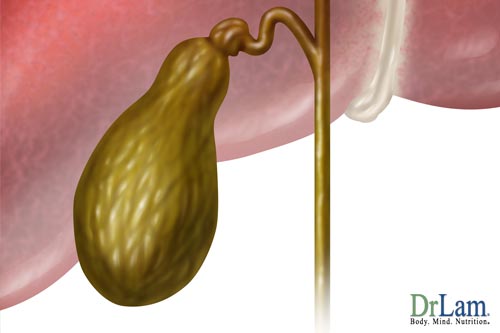 In addition to the liver, cortisol also has a strong and direct effect on gallbladder and bile production. When we are hungry, cortisol, a glucocorticoid hormone, is released from the adrenal glands. Upon reaching the liver, glucocorticoid receptors are activated, and the gallbladder prepares for the imminent food intake. After a meal, bile is released from the gallbladder into the intestine. Bile acids contained in bile are critical for fat digestion. They emulsify fats into small constituents so fat can be broken down and absorbed. After that job is completed, bile is recycled through the blood back to storage in the gallbladder. Our body recovers ninety-five percent of bile acids from the bowel content. This important recycling process is controlled in part by cortisol. If the cortisol level is off balance or dysregulated, our gallbladder function will automatically be affected negatively. Symptoms can include liver/gallbladder discomfort after a meal, improper digestion with food particles in the stool, and signs of toxic overload such as brain fog, fatigue, and lethargy after a meal.
In addition to the liver, cortisol also has a strong and direct effect on gallbladder and bile production. When we are hungry, cortisol, a glucocorticoid hormone, is released from the adrenal glands. Upon reaching the liver, glucocorticoid receptors are activated, and the gallbladder prepares for the imminent food intake. After a meal, bile is released from the gallbladder into the intestine. Bile acids contained in bile are critical for fat digestion. They emulsify fats into small constituents so fat can be broken down and absorbed. After that job is completed, bile is recycled through the blood back to storage in the gallbladder. Our body recovers ninety-five percent of bile acids from the bowel content. This important recycling process is controlled in part by cortisol. If the cortisol level is off balance or dysregulated, our gallbladder function will automatically be affected negatively. Symptoms can include liver/gallbladder discomfort after a meal, improper digestion with food particles in the stool, and signs of toxic overload such as brain fog, fatigue, and lethargy after a meal.
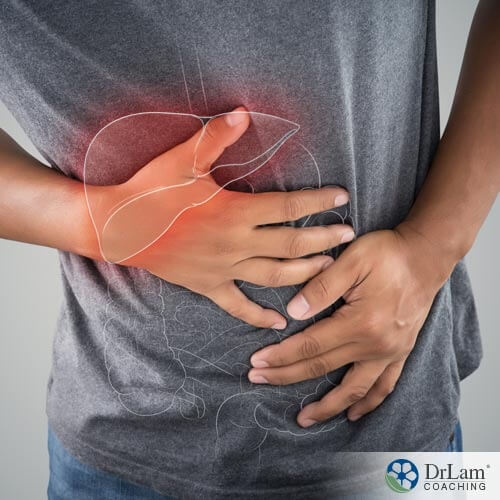 While small fluctuations of cortisol levels within the body are well tolerated during normal daily living, chronic imbalance and dysregulation can be problematic. Chronic stress is particularly worrisome, because it leads to overactivation of the HPA axis, resulting in Adrenal Fatigue Syndrome mentioned earlier. A healthcare practitioner well-versed in the different aspects of adrenal fatigue will help you determine your stage of adrenal fatigue.
While small fluctuations of cortisol levels within the body are well tolerated during normal daily living, chronic imbalance and dysregulation can be problematic. Chronic stress is particularly worrisome, because it leads to overactivation of the HPA axis, resulting in Adrenal Fatigue Syndrome mentioned earlier. A healthcare practitioner well-versed in the different aspects of adrenal fatigue will help you determine your stage of adrenal fatigue.
In the early stages of AFS, cortisol, the main anti-stress hormone, rises. This is part of the automatic compensatory effort of the adrenal glands to help the body deal with stress. The unintended consequence is increased risk of fatty liver that can eventually lead to liver congestion or a sluggish liver in layman’s terms. Unfortunately, this is seldom attended to as a possible risk because symptoms of liver dysfunction have yet to surface in early stages of AFS, where most sufferers remain asymptomatic. While they may be tired and unable to work at peak performance, this is compensated by taking in caffeine drinks and sugary foods as sources of energy. The adrenal fatigue diet may help in combatting many of the symptoms associated with adrenal fatigue.
The underlying insult to the liver because of stress induced AFS and resulting high cortisol continues unabated unless the stressors are removed. If left unabated, the liver workload increases and liver function is marginalized. Breakdown of metabolic products slows, resulting in sluggish liver or stagnation. Like a clogged water pipe, excess input will only create a backlog and spillover at the source. Weak liver function and resulting congestion leads to a rise in the level of internal toxins, as toxic metabolites remain unprocessed and thus unable to be broken down into less harmful metabolic byproducts for excretion out of the body.
 Accumulation of such toxins within the liver can be responsible for a myriad of symptoms. They include fatigue, anger, psoriasis, neck and back tension, acne, acidosis, eczema, joint and muscular pain of unknown origin, cramps, menstrual irregularities, PMS, dizziness, pulsating headaches, insomnia, depression, anxiety, hormonal imbalance, brain fog, food sensitivity, insomnia, intolerance or sensitivity to drugs and nutritional supplements. A weak liver may also weaken the kidneys and contribute to digestive problems, including lowered vitamin B12 absorption.
Accumulation of such toxins within the liver can be responsible for a myriad of symptoms. They include fatigue, anger, psoriasis, neck and back tension, acne, acidosis, eczema, joint and muscular pain of unknown origin, cramps, menstrual irregularities, PMS, dizziness, pulsating headaches, insomnia, depression, anxiety, hormonal imbalance, brain fog, food sensitivity, insomnia, intolerance or sensitivity to drugs and nutritional supplements. A weak liver may also weaken the kidneys and contribute to digestive problems, including lowered vitamin B12 absorption.
When the liver is chronically congested, sediment often settles out of the bile and accumulates in clumps that resemble stones or sand in the gallbladder. As a result, the gallbladder can become clogged as well. Pre-existing stones can further aggravate the situation as they become lodged in the bile duct leading to the small intestine. It is common for AFS sufferers to complain of discomfort in the gallbladder area, especially after a meal.
You can tell how well a person’s liver and gallbladder is functioning simply by looking carefully at a person’s skin color, tone, pigmentation level, and texture. Dry, pale, and mottled skin with dark spots and pigmentation are signs of underlying sluggish liver. Unfortunately, by the time these are observed, congestion within can be well entrenched.
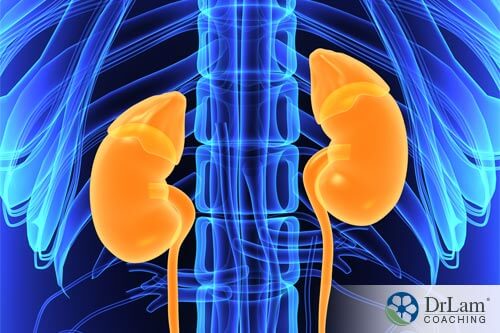 As AFS proceeds to more advanced stages, the adrenal glands become exhausted in a continuous effort to put out ever increasing demands of the anti-stress hormone cortisol. Over time, cortisol output begins to drop below normal after reaching peak output. Low cortisol level affects gallbladder function by negatively impacting the bile recycling process. Fat metabolism becomes suboptimal. With the resulting deregulated fat metabolism, the liver is further burdened with an increased workload. The detoxification pathways responsible for breaking down substrates into smaller toxic metabolites within the liver are marginalized. Internal toxin buildup increases, further overloading the liver and the body, which has been working hard since AFS appeared.
As AFS proceeds to more advanced stages, the adrenal glands become exhausted in a continuous effort to put out ever increasing demands of the anti-stress hormone cortisol. Over time, cortisol output begins to drop below normal after reaching peak output. Low cortisol level affects gallbladder function by negatively impacting the bile recycling process. Fat metabolism becomes suboptimal. With the resulting deregulated fat metabolism, the liver is further burdened with an increased workload. The detoxification pathways responsible for breaking down substrates into smaller toxic metabolites within the liver are marginalized. Internal toxin buildup increases, further overloading the liver and the body, which has been working hard since AFS appeared.
Throughout the AFS progression from mild to severe, relentless insult on the liver continues. This results in the vicious cycle of a decompensating liver faced with a concurrently increasing metabolic workload as AFS advances. The liver is a silent soldier bearing much more of the brunt of a losing battle at the frontlines. It comes as no surprise that most sufferers of advanced AFS usually have some degree of sluggish liver and dysfunction at the same time. However, physical and laboratory examination continues to be normal as the injury is occurring at the cellular level and therefore remains sub-clinical and evades detection.
 The clinically important question when dealing with AFS sufferers in advanced stages is not about whether the liver is involved but more about the degree of congestion and the level of reserve remaining in the liver for normal function. Bear in mind that even at this point, no gross pathological signs of hepatic cell injury are apparent therefore the concept of liver fatigue evades the conventional medical world and is merely passed over as insignificant with no action required. This may work well for those who are constitutionally strong.
The clinically important question when dealing with AFS sufferers in advanced stages is not about whether the liver is involved but more about the degree of congestion and the level of reserve remaining in the liver for normal function. Bear in mind that even at this point, no gross pathological signs of hepatic cell injury are apparent therefore the concept of liver fatigue evades the conventional medical world and is merely passed over as insignificant with no action required. This may work well for those who are constitutionally strong.
Those who have a prior liver injury such as hepatitis, poor lifestyle habits such as a history of excessive alcohol use, or a weak constitution tend to do worse.
Unfortunately, routine liver function tests will be unremarkable, and liver congestion is usually ignored as a contributing factor to fatigue, while AFS progresses.
Even among alternative health care practitioners, the usual focus with the patient is on generating energy when faced with fatigue as the chief complaint. This usually leads to the use of energy stimulating herbs and adaptogens such as ashwagandha, rhodiola, maca root, green tea, as well as glandular. Without a healthy liver to break down these compounds, workload of an already overburdened liver only increases, resulting in further congestion. It comes as no surprise that with chronic use of herbs, hormones, medications and glandular in the AFS setting, the risk of liver congestion increases.
When considering a healthcare practitioner and you suspect adrenal fatigue is the culprit, please make sure it is someone knowledgeable about all aspects of the condition.
 A comprehensive adrenal fatigue recovery plan for those in advanced stages of AFS should therefore consider liver optimization as an important component. A detailed history is required as a starting point. However, depending on the level of liver fatigue and congestion already suffered, recovery is easier said than done.
A comprehensive adrenal fatigue recovery plan for those in advanced stages of AFS should therefore consider liver optimization as an important component. A detailed history is required as a starting point. However, depending on the level of liver fatigue and congestion already suffered, recovery is easier said than done.
Chronic AFS sufferers in advanced stages tend to be fragile and weak. This is especially true if there is a long history of adrenal crashes and prior use of glandular, herbs, and steroid medications. This historic backdrop presents special challenges. Like a rubber band that has been repeatedly used and overstretched over time, the risk of breaking increases exponentially with each stretch after the breaking threshold is reached. The threshold breaking point that indicates where rapid decompensation takes place is not readily known and varies from person to person, due to the lack of clear laboratory indicators or signs.
Those who experience adrenal crashes repeatedly will generally be able to tell when they are close to this breaking point. Unfortunately, by the time they are on the alert, the body has already suffered much damage internally. Most are unaware of the damage within until too late, when the crash happens. That is why many advanced AFS sufferers experience repeated setbacks and congested liver and failed in their recovery efforts despite their best attempts, even with professional help. Not being alert and attentive to early signs of detoxification failure and congestion within is a common mistake during AFS recovery. Many of the people in our program have been there.
 The more advanced the AFS, the higher the risk. Liver congestion may be so severe internally that any gentle attempt to detoxify or cleanse the liver by the ways previously mentioned may trigger adrenal crashes and paradoxical reactions. Cleanses, flushes, sauna, wheatgrass ingestion, steroid use, and IV therapy are common culprits. They are widely touted as excellent healing and detoxification tools, but the body disagrees. The problem is not so much on the approach but the already marginalized body with minimal reserves.
The more advanced the AFS, the higher the risk. Liver congestion may be so severe internally that any gentle attempt to detoxify or cleanse the liver by the ways previously mentioned may trigger adrenal crashes and paradoxical reactions. Cleanses, flushes, sauna, wheatgrass ingestion, steroid use, and IV therapy are common culprits. They are widely touted as excellent healing and detoxification tools, but the body disagrees. The problem is not so much on the approach but the already marginalized body with minimal reserves.
The liver and the adrenal glands are intimately connected through cortisol, the main anti-stress hormone. Cortisol dysregulation can lead to liver fatigue and gallbladder dysfunction. Similarly, severe liver disease is associated with adrenal insufficiency. When the adrenals are overstressed, the liver can become congested over time. The weaker the adrenals become, the higher the risk. Liver congestion represents an important roadblock to complete Adrenal Fatigue Syndrome recovery. This is seldom recognized. Without careful consideration to liver function, intracellular function, and the extracellular matrix, indiscriminate use of herbs, drugs, detoxifiers, and glandular compounds can worsen liver function and AFS concurrently. They should be placed on hold while a more fundamental approach to optimize the internal milieu takes priority.
The main focus of our program is identifying the root cause of your adrenal fatigue and then taking the correct steps to rectify the problem. This we do by designing a program specifically geared towards your recovery. Remember, no two people are the same. Neither is their solutions to recovery.
They all contain the active ingredient for detox: activated charcoal.
The molecules in Zeolites can be used to attract and hold several types of toxins and heavy metals like lead, aluminum cadmium, arsenic and mercury. These metals are then passed out of the body through urination and defecation.
Yes, the Bemer machine helps to increase the circulation. Therefore more metabolites can be carried away. If you have AFS, you have to be careful not to overdo it.
Studies have shown that 1 cup of coffee could have health benefits. You should know that if you do drink coffee, it is for pleasure only and not to stimulate you.
If you need to take energy drinks to get through the day, you may be suffering from AFS. When you have AFS, it does affect your liver. Supplementation is hard to recommend, sometimes singles are better, sometimes a combination is more effective because of the synergistic effect.
Add cucumber, mints, apples, or berries.
High liver enzymes are not normal. You should continue to follow your doctor's advice, find out what is the underlying cause of the elevated liver enzymes.